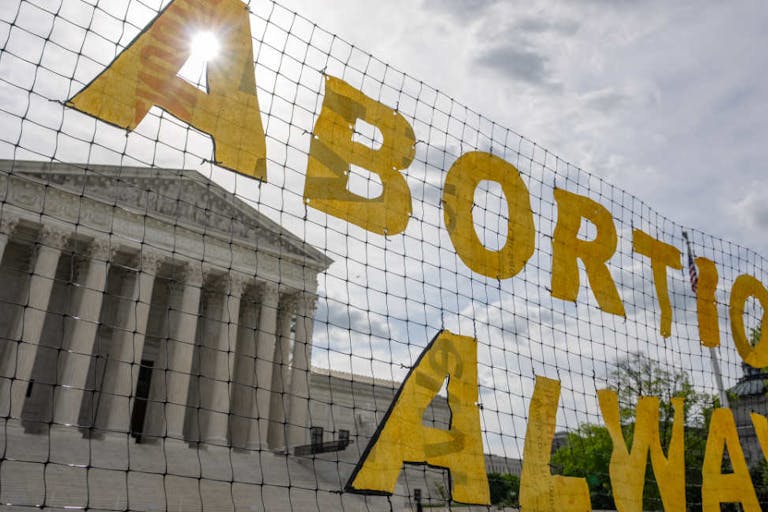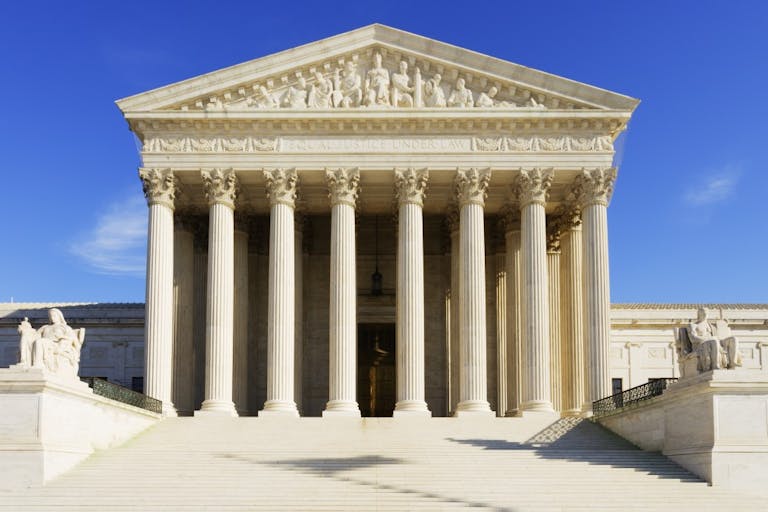
A growing number of Americans call themselves ‘pro-choice’ – but what’s really behind it?
Nancy Flanders
·
Will “undue burden” test throw a wrench into Supreme Court case on TX abortion law?
Now that we know the US Supreme Court will hear the case of Texas’s law subjecting abortion clinics to admitting privilege and ambulatory surgical standards, KUT News 90.5 in Austin, TX reports that the Supremes will decide the law’s fate by applying the “undue burden test,” which assumes as a given that the right to abortion is constitutionally valid yet considers whether the law places a “substantial obstacle” on exercising that right…
“The state has wide discretion to pass laws ensuring Texas women are not subject to substandard conditions at abortion facilities,” said Attorney General Ken Paxton in a statement. “The advancement of the abortion industry’s bottom line shouldn’t take precedent over women’s health, and we look forward to demonstrating the validity of these important health and safety requirements in Court.”
Amy Hagstrom Miller, the lead plaintiff in the case against the law, however, says what it does in practice is deny women their right to an abortion.
“Driving hundreds of miles and waiting 20 days for an appointment — that is by far and away undue burden,” Hagstrom Miller says.
Objectively, the merits would seem to be on pro-lifers’ side. Last year, Texas Right to Life noted that despite receiving almost 20,000 comments about the law, the Texas Department of State Health Services admitted that none of them contained “any basis to believe that abortion providers would be unable to make similar adjustments” to complaining abortion providers who “nonetheless received admitting privileges and either stayed open or reopened.”
This “claim is deeply deceptive,” they further write, since abortion advocates here are pretending that women in El Paso will drive three hours east to San Antonio, instead of driving 20 minutes west to the abortion clinic in Santa Teresa, New Mexico, or driving 45 minutes northwest to a new abortion clinic in Las Cruces, New Mexico.”
Unfortunately, reasonableness often has little to do with SCOTUS’s decisions. The problem is that the ground has been gerrymandered to pro-aborts’ liking before the question was even asked. “Undue burden” is yet another incident of the modern judiciary’s bad habit of interpreting the Constitution not through a straightforward reading of what its provisions’ authors said it meant versus the statute before the court, but through convoluted “tests” originating solely in judges’ personal notions of justice.
Article continues below
Dear Reader,
In 2026, Live Action is heading straight where the battle is fiercest: college campuses.
We have a bold initiative to establish 100 Live Action campus chapters within the next year, and your partnership will make it a success!
Your support today will help train and equip young leaders, bring Live Action’s educational content into academic environments, host on-campus events and debates, and empower students to challenge the pro-abortion status quo with truth and compassion.
Invest in pro-life grassroots outreach and cultural formation with your DOUBLED year-end gift!
Among this particular test’s shortcomings is that “undue burden” does not have a precise or objective legal meaning and is therefore subject to the biased interpretation of any individual judge and that it flips the burden of proof from the feds having to prove that their intervention serves a “compelling interest” not otherwise achievable to the states having to prove they’re playing nice with the judiciary’s favored legal fictions such as Roe v. Wade.
This is not how the constitutionality of controversial laws is supposed to be decided. Indeed, the word “constitutionality” should be a clue that the question is far simpler: does the Constitution allow us to do this? Let’s do a quick walk-through of how a properly functioning judiciary would decide this one:
According to Father of the Constitution James Madison, “The powers delegated by the proposed Constitution to the federal government are few and defined. Those which are to remain in the State governments are numerous and indefinite,” extending to “all the objects which, in the ordinary course of affairs, concern the lives, liberties, and properties of the people, and the internal order, improvement, and prosperity of the State.” Are we dealing with a federal or state law? State? Okay, that means the general supposition is that Texas can do it unless something in their or the federal Constitution says otherwise.
Does anything in the US Constitution say there is a right to abortion that states are bound to respect, or that abortion clinics warrant a special exemption from government regulation? Despite Roe v. Wade, no, it does not.
Does anything in the US Constitution forbid states from imposing safety regulations on private entities? No, it does not. The body of the document is solely concerned with restricting the federal government. Its only provision touching on the subject, the Commerce Clause, only touches activity crossing state lines, and does so for a very limited purpose. And none of its amendments have added any provisions saying otherwise.
Does anything in the Texas Constitution tie the legislature’s hands in this area in any ways that differ from the US Constitution? Again, no. The word “abortion” is again nowhere to be found, and neither Planned Parenthood nor NARAL’s overviews of state abortion laws can identify a specific section that has supposedly been violated.
I hope the Supreme Court sides with Texas’s pro-life lawmakers and the pregnant women they’re protecting, but can’t say I’m expecting them to do the right thing. Reforming the judiciary and the legislative branch’s checks on it, to give pro-life voters a fighting chance of passing meaningful laws without being disenfranchised at every turn, is long overdue.
Live Action News is pro-life news and commentary from a pro-life perspective.
Contact editor@liveaction.org for questions, corrections, or if you are seeking permission to reprint any Live Action News content.
Guest Articles: To submit a guest article to Live Action News, email editor@liveaction.org with an attached Word document of 800-1000 words. Please also attach any photos relevant to your submission if applicable. If your submission is accepted for publication, you will be notified within three weeks. Guest articles are not compensated (see our Open License Agreement). Thank you for your interest in Live Action News!

Nancy Flanders
·
Guest Column
Emily Berning
·
Opinion
Nancy Flanders
·
Opinion
Mark Wiltz
·
Opinion
Mark Wiltz
·
Pop Culture
Madison Evans
·
Guest Column
Calvin Freiburger
·
Abortion Pill Reversal
Calvin Freiburger
·
Guest Column
Calvin Freiburger
·
Abortion Pill Reversal
Calvin Freiburger
·
Activism
Calvin Freiburger
·